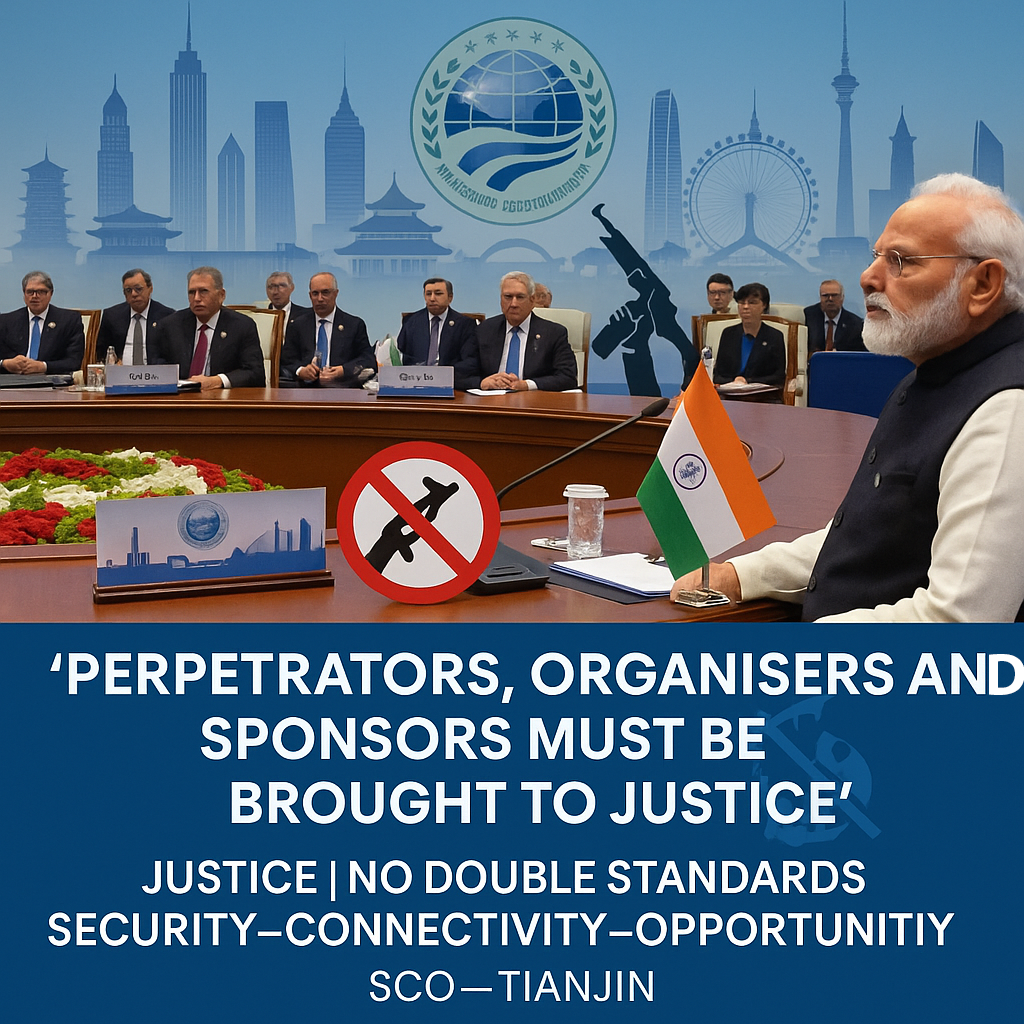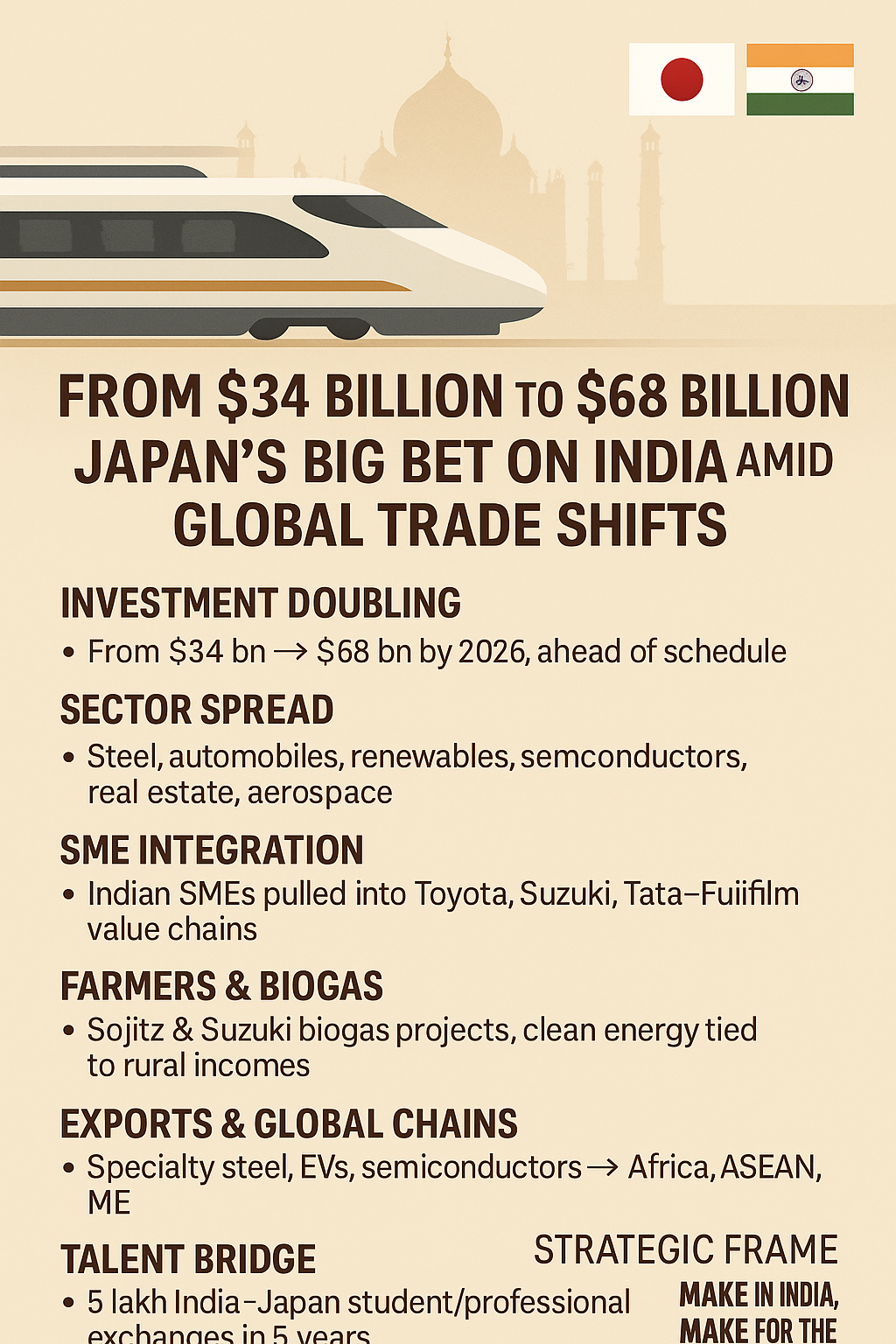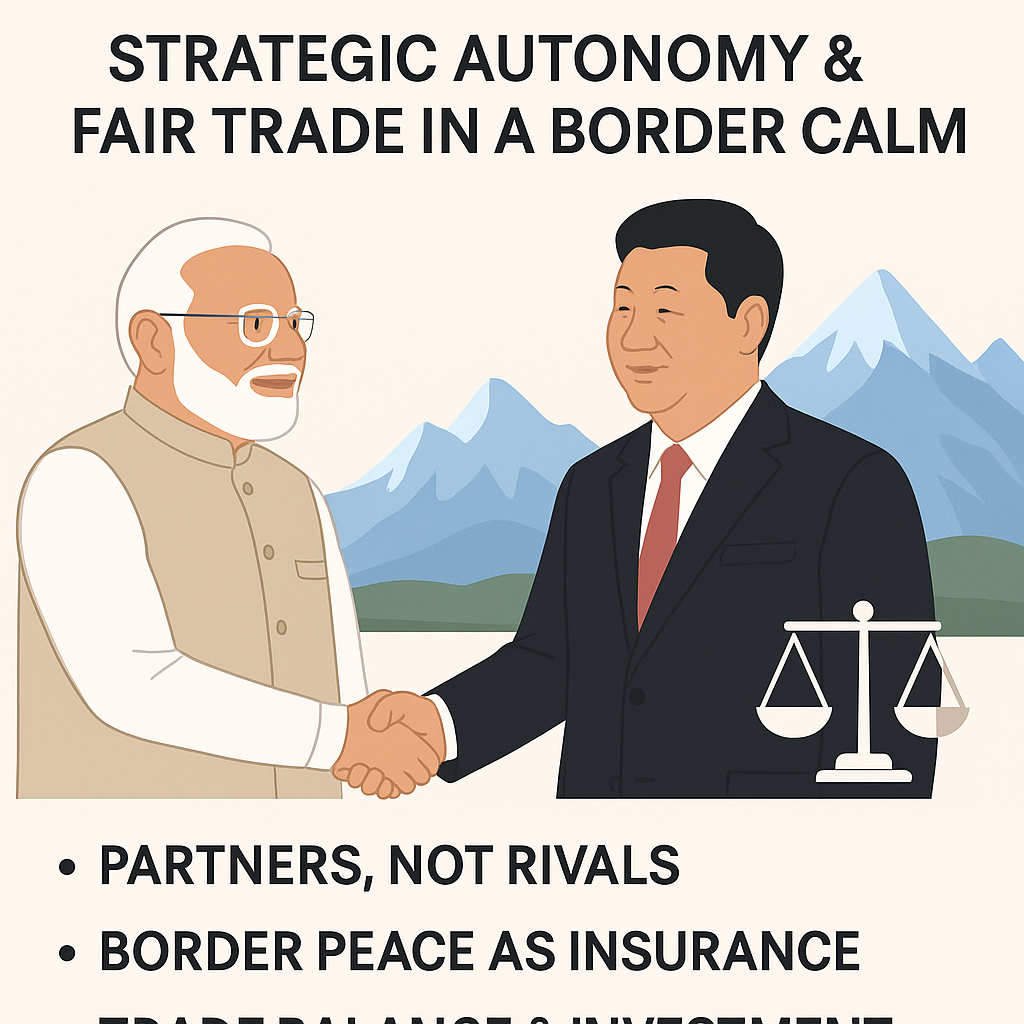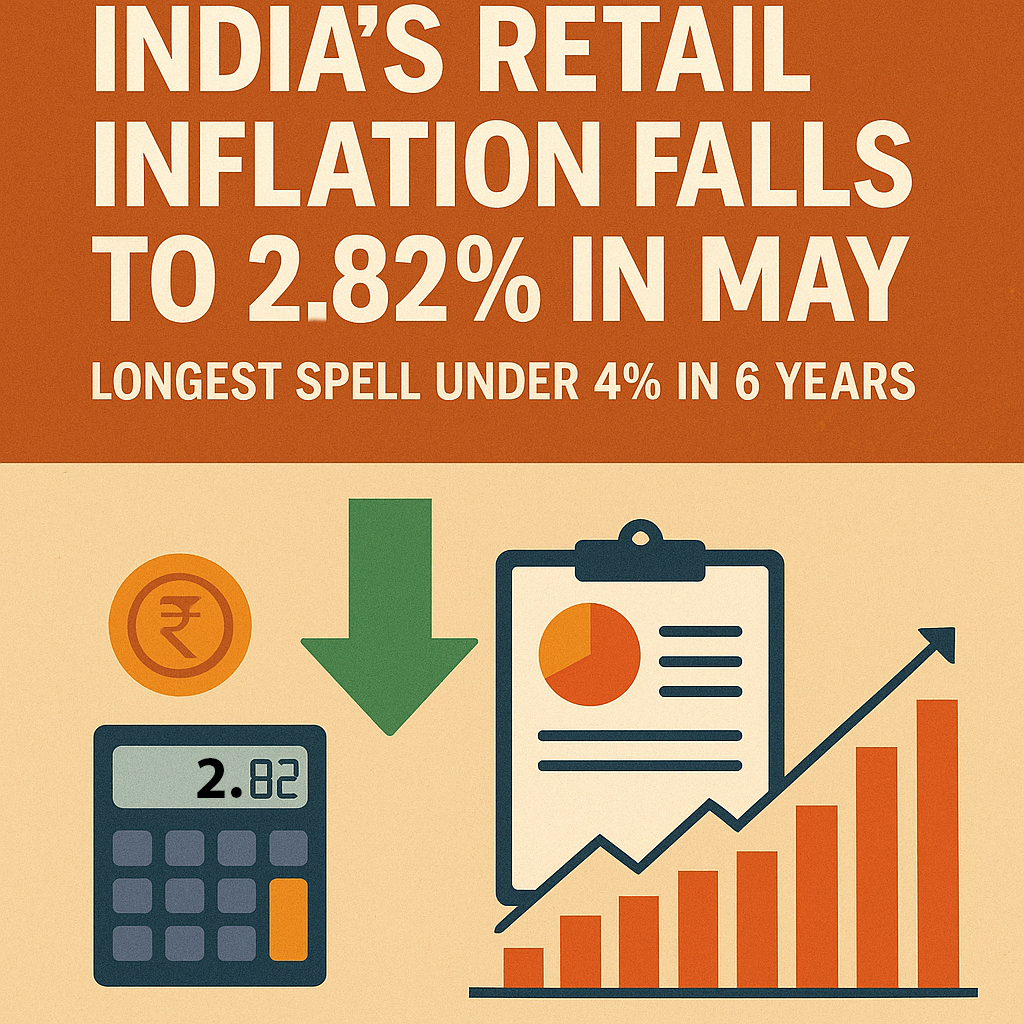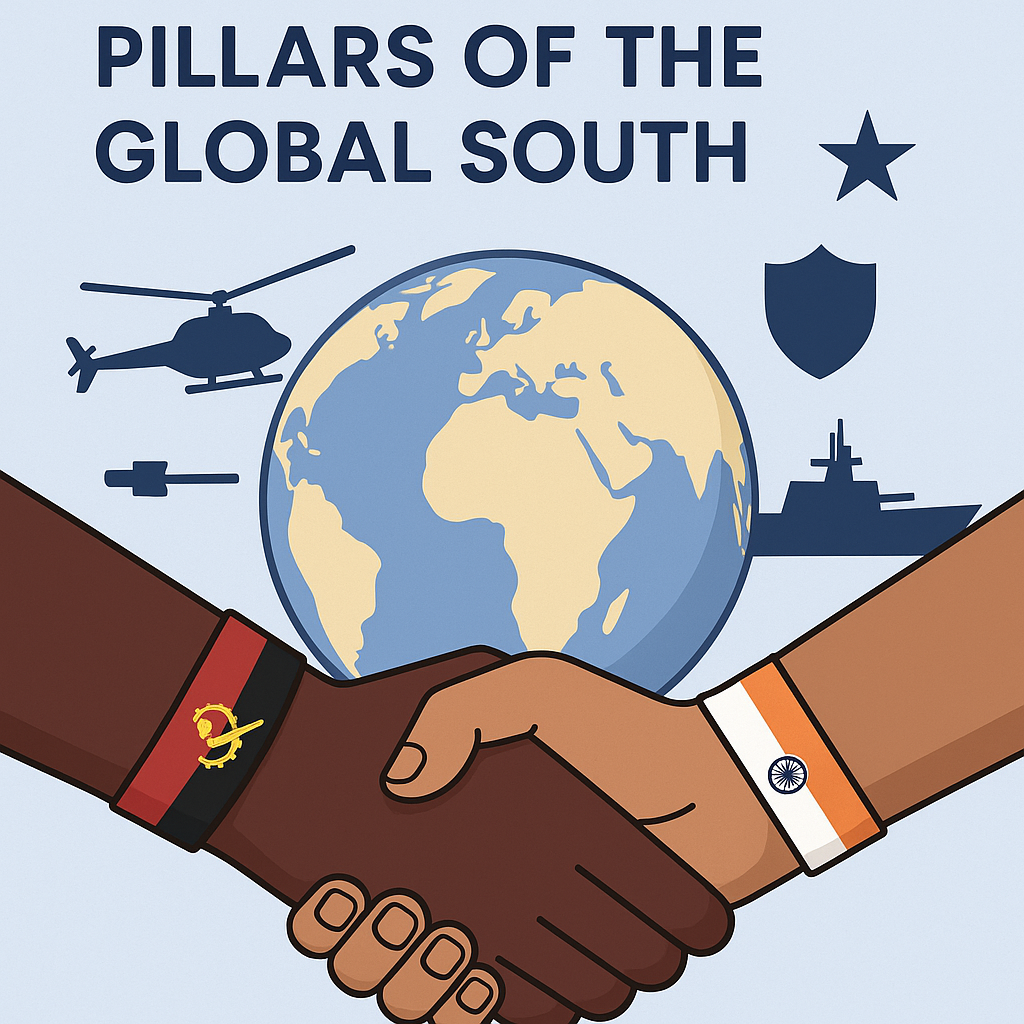
📅 May 4, 2025, Post 5: India-Angola: Partners in Peace, Pillars of the Global South | Mains Essay Attached | Target IAS-26 MCQs Attached: A complete Package, Dear Aspirants!
India-Angola: Partners in Peace, Pillars of the Global South

INTERNATIONAL HERO — PETAL 005
May 4, 2025
🌍 Thematic Focus:
• India-Africa Relations
• Counter-Terrorism Diplomacy
• Defence Cooperation
• South-South Partnerships
🌿 Opening Whisper:
“In the garden of diplomacy, solidarity is the sunlight — and peace, the shared fruit.”
🕊️ Key Highlights:
• Angolan President João Lourenço, during his state visit to India, condemned the Pahalgam terror attack, calling it a “heinous, cowardly act”.
• PM Narendra Modi reaffirmed India’s commitment to fight cross-border terrorism, thanking Angola for its expression of solidarity.
• India extended a $200 million defence credit line to Angola for modernising its defence forces, boosting South-South military cooperation.
• The visit marks the 40th anniversary of India-Angola diplomatic ties (established in 1985), and Angola currently chairs the African Union, elevating the symbolism of this moment.
• Several MoUs were signed in healthcare, agriculture, traditional medicine, and critical minerals, with India promising support in digital infrastructure, space technology, and capacity building.
• Angola also formally signed the International Solar Alliance (ISA) Framework Agreement, initiated by India for global clean energy cooperation.
• External Affairs Minister S. Jaishankar and MEA officials highlighted the growing India-Africa synergy, with Angola positioned as a pivotal partner in the continent’s future roadmap.
📘 Concept Explainer:
India–Angola: A History of Deep Ties and Shared Causes
• Formal diplomatic relations between India and Angola began in 1985, though cultural and economic exchanges predate that.
• Angola, rich in oil and critical minerals, is a major African economy. India has supported Angola’s post-war reconstruction, and Angola has backed India’s UN Security Council reforms.
• Bilateral trade has risen to over $4 billion (2023–24), with major cooperation in energy, agriculture, health, and defence.
• Angola’s chairmanship of the African Union (2025) brings strategic weight to its India ties, especially as India strengthens its voice as a leader of the Global South.
• Angola’s participation in ISA and support against terrorism strengthens both geostrategic and moral alliances between the two democracies.
📌 GS Paper Mapping:
• GS Paper 2 – International Relations: India–Africa relations, South-South Cooperation
• GS Paper 3 – Internal Security: Terrorism, Defence Cooperation
• GS Paper 1 – World Affairs: Role of regional blocs like the African Union
🪶 A Thought Spark — by IAS Monk:
“Alliances built on justice and shared sorrow are stronger than any weapon. When one nation weeps, and another stands beside it — that is the true architecture of peace.”
High Quality Mains Essay For Practice :
Word Limit 1000-1200
India–Angola Relations: A Pillar of the India–Africa Partnership
In the symphony of global diplomacy, some relationships are silent, steady notes — less flashy, more foundational. The bilateral ties between India and Angola represent such a relationship — not just a two-way exchange, but a bridge linking the aspirations of two continents. As Angola assumes the Chair of the African Union and marks 40 years of diplomatic engagement with India, the relationship now holds regional and global resonance. From counter-terrorism solidarity to defence cooperation and green energy partnerships, India–Angola relations today illuminate India’s vision for a just, inclusive, and multipolar world order — a world where the Global South writes its own destiny.
A Historical Foundation of Mutual Support
India and Angola formally established diplomatic relations in 1985, a few years after Angola’s independence from Portugal in 1975. Angola, the resource-rich southern African country with vast reserves of oil, diamonds, and critical minerals, soon became a strategic partner for India’s outreach to the African continent.
India was among the first Asian nations to support Angola’s anti-colonial and anti-apartheid struggles, aligning itself with the liberation movements in Africa. This early support cemented goodwill and has been reciprocated over the years through mutual backing at multilateral forums, including India’s longstanding aspiration for a permanent seat at the UN Security Council.
The Non-Aligned Movement (NAM) and South-South Cooperation also form the ideological undercurrents of this relationship, reinforcing a post-colonial solidarity that values strategic autonomy, people-centric development, and multilateralism.
Economic and Developmental Engagements
Trade between India and Angola reached $4 billion in 2023–24, with India importing crude oil and diamonds, and exporting pharmaceuticals, machinery, textiles, and food products. Angola is India’s third-largest trading partner in Africa, reflecting the economic complementarity between India’s developmental needs and Angola’s resource base.
Beyond commerce, India has extended significant developmental assistance through Lines of Credit (LoCs), grants, and capacity-building programs under the Indian Technical and Economic Cooperation (ITEC) scheme. Over 300 Angolan professionals have been trained in areas like ICT, entrepreneurship, agriculture, and public health — enabling long-term people-to-people connect.
The recently announced $200 million defence credit line for Angola’s armed forces modernisation not only deepens trust but showcases India’s emerging role as a security partner for peacekeeping and conflict-prevention in Africa.
The Geopolitical Significance: Angola as AU Chair
Angola’s current position as Chair of the African Union (AU) gives its diplomatic actions continental weight. This context elevates President João Lourenço’s recent condemnation of the Pahalgam terror attack during his state visit to India into a broader message of African solidarity against terrorism — particularly cross-border terrorism, which has global ramifications.
India’s alignment with Angola at this juncture becomes part of a larger effort to redefine African agency in global governance, technology cooperation, and climate change discourse. It also strengthens India’s ability to work collaboratively with AU institutions, especially as the AU gains a permanent seat in the G20 — an achievement supported by India during its G20 presidency.
In this geopolitical reconfiguration, India–Angola ties serve as an anchor — bringing credibility, continuity, and cultural sensitivity to India’s Africa outreach.
Energy, Health, and Green Transitions
Angola, with its hydrocarbon wealth, is a crucial player in India’s energy diversification strategy. However, both countries are now pivoting to sustainable development, with Angola signing the International Solar Alliance (ISA) Framework Agreement during the visit — joining a coalition that reflects India’s global leadership in climate diplomacy.
In the healthcare sector, India has committed to sharing its pharmaceutical capacity, AYUSH systems, and telemedicine frameworks. The MoU on traditional medicine signed with Angola mirrors similar agreements with over 30 African countries and reflects a shared civilizational heritage rooted in community healing.
The engagement in critical minerals is equally timely, as India seeks to reduce dependence on Chinese supply chains. Angola, rich in rare earth elements and cobalt, is a natural partner in creating resilient mineral value chains for the energy transition.
Defence Diplomacy and Strategic Outreach
The growing security cooperation — including joint training, supply of defence equipment, and credit-based modernisation support — is part of India’s broader effort to build Africa as a security stakeholder, not merely a development recipient.
India has trained thousands of African military officers through the Indian Army Training Teams, hosted Defence Ministerial dialogues, and supported UN Peacekeeping efforts with African partners. The India-Angola defence credit line is thus part of a long-standing tradition — now recalibrated for 21st-century realities of piracy, insurgency, and terrorism.
Cultural and Educational Bridges
The visit by President Lourenço also included tributes to Mahatma Gandhi at Raj Ghat, reinforcing the moral foundations of this partnership. India has committed to expanding scholarship schemes, educational exchanges, and cultural dialogues. This is not cosmetic diplomacy — it reflects the human touch that differentiates India’s engagement from extractive or transactional powers.
The Indian diaspora in Angola, though small, has played a vital role in healthcare, hospitality, and infrastructure sectors, further nurturing goodwill and grassroots familiarity.
Why This Bilateral Relationship Matters for Africa
India–Angola ties are not an isolated success story. They reflect India’s Africa Policy 3.0 — built on principles of local ownership, technology transfer, and solidarity. Angola’s elevation of this partnership, in its capacity as AU chair, sends a clear signal: African nations want partnerships of respect, not recolonization.
In contrast to powers that prioritize resource extraction or debt diplomacy, India offers co-creation, shared innovation, and ethical diplomacy. India does not impose — it invites. Angola is not just a recipient, but a co-architect in a new developmental model.
By working with Angola, India also strengthens its relations with Lusophone Africa, creating bridges with other Portuguese-speaking nations like Mozambique, Guinea-Bissau, and Cape Verde.
Conclusion: From Bilateral Bond to Continental Blueprint
India–Angola relations are a microcosm of the India–Africa vision — rooted in shared history, renewed through modern cooperation, and oriented toward a just global order. As the world grapples with inequality, insecurity, and environmental fragility, partnerships like these offer hope — and a template.
Whether in defence diplomacy, green energy, or counter-terrorism, Angola and India are proving that the Global South can shape the global narrative — not through dependence, but through dignified interdependence.
In the long run, this is not just about two nations — it is about a world where the roots of justice grow deep, and the branches of peace reach all.
Closing Quote:
“The true legacy of friendship is not built on aid or trade, but on shared aspirations that echo across continents.” – IAS Monk
Target IAS-26: Daily MCQs: My 4, 2025
📌 Prelims Practice MCQs
Topic: India–Angola Relations
📘 MCQ 1: India–Angola Strategic Cooperation
Which of the following statements about India–Angola relations is/are correct?
•1) India and Angola established formal diplomatic relations in 1975, the year Angola gained independence.
•2) Angola is currently the Chair of the African Union.
•3) Angola recently signed the International Solar Alliance (ISA) Framework Agreement initiated by India.
•4) Angola is among India’s top three trading partners in Africa.
A) Only two
B) Only three
C) All four
D) Only one
🌀 Didn’t get it? Click here (▸) for the Correct Answer & Explanation
✅ Correct Answer: B) Only three
🧠 Explanation:
•1) ❌ Incorrect. India and Angola established formal diplomatic relations in 1985, not 1975. •2) ✅ Correct. Angola currently chairs the African Union, adding geopolitical importance to its visit. •3) ✅ Correct. Angola signed the ISA Framework Agreement during President Lourenço’s visit. •4) ✅ Correct. Angola is India’s 3rd largest African trade partner. Hence, 2, 3, and 4 are correct.
📘 MCQ 2: India–Africa Partnership Dimensions
Consider the following areas of cooperation between India and Angola as part of India–Africa relations:
•1) Defence Credit Line
•2) Counter-terrorism Solidarity
•3) Critical Minerals and Clean Energy
•4) Space Technology and Digital Infrastructure
Which of the above are part of the current India–Angola engagement?
A) Only two
B) Only three
C) All four
D) Only one
🌀 Didn’t get it? Click here (▸) for the Correct Answer & Explanation
✅ Correct Answer: C) All four
🧠 Explanation: •1) ✅ A $200 million defence credit line was announced. •2) ✅ Angola strongly condemned the Pahalgam terror attack and expressed solidarity. •3) ✅ India and Angola discussed critical minerals, solar energy, and ISA membership. •4) ✅ India offered cooperation in digital infrastructure and space technology during the bilateral talks.
.
📘 MCQ 3: Geopolitical Significance of the Visit
Why is Angola’s 2025 state visit to India considered geopolitically significant?
•1) It marks the 50th anniversary of India–Angola diplomatic ties.
•2) Angola is the current Chair of the African Union.
•3) Angola has supported India’s permanent seat in the UN Security Council.
•4) The visit saw major defence and energy agreements signed.
A) Only two
B) Only three
C) All four
D) Only one
🌀 Didn’t get it? Click here (▸) for the Correct Answer & Explanation
✅ Correct Answer:
Answer: B) Only three
🧠 Explanation: •1) ❌ Incorrect. It marks the 40th anniversary, not the 50th. •2) ✅ Correct. Angola is AU Chair, amplifying its voice. •3) ✅ Correct. Angola has supported India at the UN and multilateral platforms. •4) ✅ Correct. Key defence credit line and energy MoUs were announced. Hence, statements 2, 3, and 4 are correct.

